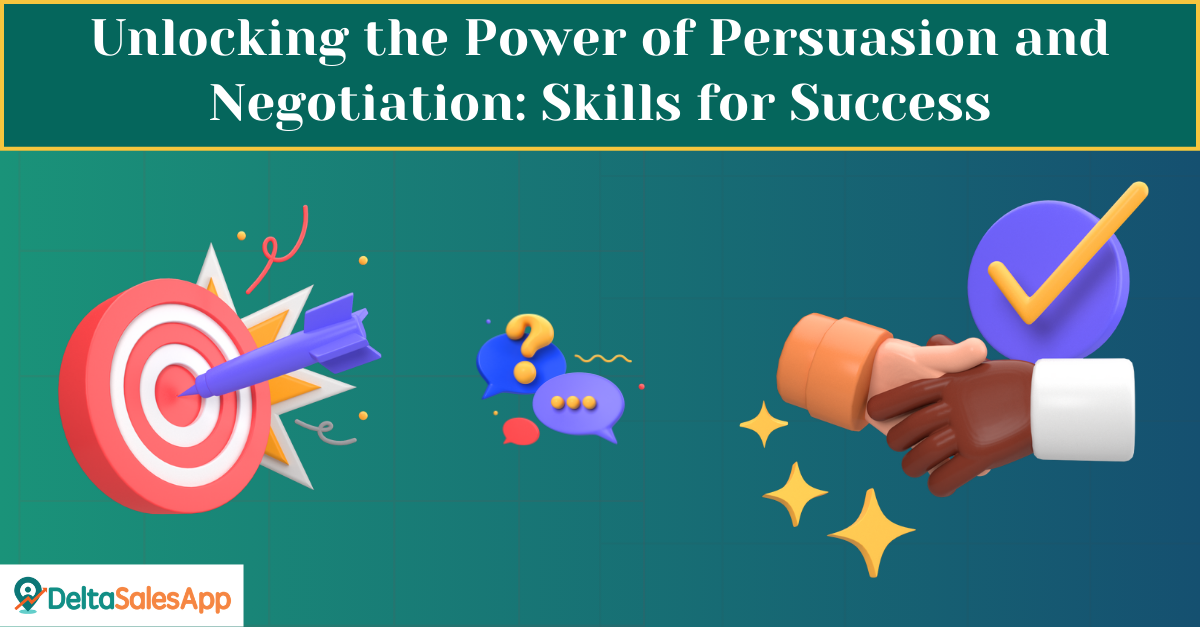Unlocking the Power of Persuasion and Negotiation: Skills for Success

In the world of sales and business, mastering the art of persuasion and negotiation is essential. Whether you're working with distributors, customers, or partners, knowing when to persuade and when to negotiate can make a world of difference. In this blog, we will dive into effective strategies for both persuasion and negotiation, helping you navigate situations with ease and achieve favourable outcomes.
Understanding Persuasion and Negotiation
Before diving into the tactics, it's important to understand the key differences between persuasion and negotiation.
Persuasion is the ability to convince someone to believe or do something. It's often about presenting compelling arguments or highlighting the benefits of a product, idea, or action.
Negotiation is about finding a mutually beneficial solution when two or more parties have different needs or interests. It involves give-and-take, with a focus on achieving a win-win situation.
Both skills are vital in sales, and knowing when to use each can significantly influence the success of your business transactions.
When to Persuade: Key Situations
Introducing New Products When launching a new product, persuasion is key. Shoppers or distributors may be hesitant or unsure about trying something unfamiliar. In such situations, it's essential to highlight the unique features and benefits of the product. Explain how it addresses a need or solves a problem for them.
Changing Perceptions If you're trying to change someone's perception of a product or service—say, a customer who has been loyal to a competitor—persuasion can help shift their mindset. Use facts, testimonials, and comparisons to present a strong case.
Building Relationships Persuasion is also a great tool for building long-term relationships. Instead of just making a one-time sale, aim to create trust and a genuine connection. This can lead to repeat business and strong customer loyalty.
When to Negotiate: Key Strategies
Dealing with Competition In highly competitive markets, negotiation is often necessary. If you're up against a competitor offering similar products at a lower price, negotiation allows you to find common ground. You can offer value through better service, exclusive perks, or flexible payment terms.
Pricing and Discounts Pricing discussions are common in negotiations. If a potential buyer or distributor is hesitant due to cost, you might need to negotiate the price or offer discounts. However, always ensure that the terms remain profitable for your business.
Setting Terms and Conditions In many business deals, the terms and conditions are subject to negotiation. This includes delivery schedules, payment methods, and after-sales services. Negotiating these aspects ensures both parties are satisfied with the agreement.
Key Negotiation and Persuasion Tactics
1. Know Your Data
Always have solid data to back up your arguments. Whether it’s sales data, market research, or customer feedback, data helps build credibility and support your case during both persuasion and negotiation.
2. Understand the Other Party's Needs
In both persuasion and negotiation, it's crucial to understand the needs of the other party. Whether you’re selling a product or working on a partnership, try to understand their motivations and concerns. This will help you tailor your approach accordingly.
3. Create a Win-Win Scenario
Negotiation, especially, should aim for a win-win outcome. If both parties leave the table satisfied, the relationship has the potential to thrive. Be flexible, but also stand firm on key points that align with your business objectives.
4. Timing is Everything
Timing plays a crucial role in both persuasion and negotiation. For example, offering an exclusive deal at the right moment can push a hesitant customer to make a purchase. Similarly, knowing when to hold back during negotiations—such as when the other party is under time pressure—can give you leverage.
How to Improve Persuasion and Negotiation Skills?
Practice Active Listening
Listening to what the other party is saying shows respect and allows you to respond appropriately. It also helps you better understand their needs and concerns, which is key to crafting persuasive arguments or negotiating effectively.
Build Rapport
Establishing a personal connection makes people more open to persuasion. In negotiations, rapport helps build trust, which makes it easier to reach an agreement.
Stay Calm and Confident
A calm and confident demeanor will help you in both persuasion and negotiation. People are more likely to be convinced by someone who projects confidence and control over the situation.
Be Willing to Walk Away
Knowing when to walk away from a negotiation is just as important as knowing when to make a deal. If terms aren’t favourable, be prepared to politely exit the conversation, leaving room for future opportunities.
Conclusion
Persuasion and negotiation are invaluable skills in business and sales. Understanding when to use each approach, backed by solid data and a clear understanding of the other party’s needs, can significantly improve your sales outcomes. Remember, successful persuasion and negotiation are all about creating mutually beneficial relationships, building trust, and ensuring that both parties walk away satisfied.
By practicing these skills and being mindful of the situation, you’ll be well on your way to becoming an expert in navigating complex sales and business scenarios.
We hope you found this blog helpful! If you’re looking for more tips on improving your sales strategy.









